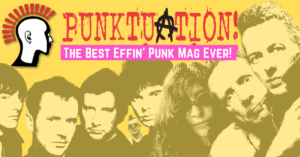In a new book author, Aaron Carne explores the legacy of the U.S. Ska scene. Punktuation caught up with the author to discuss his idea behind the book.
If you’ve ever felt that ska is unfairly maligned, not taken seriously, or not given the musical credibility afforded to other genres, then you are not alone. In Aaron Carne’s new book In Defense of Ska, the author takes on the haters and makes a compelling case about the vibrant genre’s musical history and legacy.
The book has been a few years in the making and a labour of love for Carnes, a music journalist since 2009 who’s been writing about ska for many years. Previously a member of ska-punk band Flat Planet, Carnes was there to experience the U.S. ’90s ska-punk boom first-hand.

So what inspired him to write the book now?
“I felt like there was a lack of books documenting post-Jamaican ska, so I sent off a book proposal to publishers explaining that I was writing a book about defending ska- a genre I love,” Aaron explains.
“At the heart of my motivation, I wanted to show people that there was more to the genre than the ’90s mainstream ska and the countless bad jokes about fedoras, checkered pants, and dorky suburban white kids. I wanted to show the diversity and variety of ska; the reason I first fell in love with it – the reason I stayed engaged in the genre.

“It’s a unique scene and subculture that gets completely ignored by popular culture. Even in the ’90s, it was way oversimplified to the point that was presented as a goofy trend, not as a healthy subculture with hundreds of interesting bands and decades of work behind it.”
The premise of the book defending ska’s credibility may strike more of a chord depending on where you are from. For those in the UK, where ska is more associated with the 2-Tone of the Thatcher years, ska has an element of cool that has endured.
On the other side of the pond, 2-Tone had a niche following in the US, and therefore,, for many people, mentioning ska puts them in mind of Reel Big Fish, Mighty Mighty Bosstones and Rancid, losing something of the genre’s illustrious past.
It may be strange for some of us in the UK, or those who are more familiar with 2-Tone, to feel that ska needs defending at all, so is it a matter of which wave of ska you’re more familiar with that determines whether it has been considered cool and credible?

Carnes Agree: “The funny thing about that is that in the early ’90s, ska bands looked a lot of different ways. Some wore cool-looking suits, some just dressed in t-shirts and shorts. And then everything in-between. Reel Big Fish wore Hawaiian shirts, and the Mighty Mighty Bosstones wore plaid suits. Those two fashion choices were specific to those two bands, not ska. Yet by the late ’90s, they came to define the look of the genre because MTV didn’t get it.”
Ska in the US in the ’90s was so healthy that every band could pick and choose which ska elements they liked, and they could meld it with whatever other styles they were into and create something new. And there were a lot of bands that created their own, unique thing. Reel Big Fish were a unique band that did the same thing in 1992 to small crowds as they were doing in 1997 on MTV.

“I think most of us in the scene understood that. But the younger kids getting into ska from MTV likely didn’t. They saw the half-dozen bigger bands as curators of this “third wave” of ska. And by the way, I don’t care for that term because it re-enforces this idea that ska was a ’90s trend in the US, and not that it was a continuous, healthy subculture for decades that came off the back of 2-Tone immediately in the early ’80s that never went anywhere, but slowly evolved over time.”
In Defense of Ska is not a chronological history of ska music, although there is plenty about the history of the genre packed in the pages. Instead, it reads like an anthology of essays, anecdotes, interviews, and opinions that explore the underpinning of the genre – where it started, where it went, where it’s still going – with the life events that paint a picture of a scene always playing the underdog but mainly having a great time in the process.
For Carnes, it was a stylistic choice that best reflected what he saw as the purpose of the book:
“I’m very proud of the fact that the book isn’t chronological. I think it’s perfect because the book’s point isn’t to tell the story of how ska evolved and to be completist in any way; it’s to paint a picture of ska as a worthwhile genre that deserves respect.
“I did that by showing ska in as many different angles as I could. I used my experience as a journalist to piece together lost ska history, analysed misunderstood ska subcultures, and even told some of my own stories as a ’90s ska kid. Everything I did served to defend ska, or at least demonstrate why the genre is so much more than the ’90s pop trend that a lot of people see it as.”
There’s something for everyone in the book, whether you consider yourself a ska aficionado or just have a passing interest in learning more about the genre. Carnes takes us on a non-linear trek through everything the ska scene has had to offer- from Don Drummond to Reel Big Fish, from The Specials to Operation Ivy.
There is space dedicated to pretty much all incarnations of the genre – exploring its development in Jamaica in the 1960s; through to the 2-Tone of the 1980s; then of the commercially successful ska-punk hybrid from the US and right through to the scene that is still going strong today. If you can think of a ska band that has existed at any point in the last 50 odd years, chances are they are mentioned in this book.

The book is a celebration of a genre that has perhaps not been given its due in the way some other alternative genres have – perhaps its all the fun people seem to have at ska shows that gives the impression of it being a bit of a throwaway genre, not carrying the serious messages that punk does.
Does Carnes feel it is fair to think of the later ska bands as lacking political messages? Is that where some of the dismissals come from?
“I totally get that. 2-Tone was a very unique moment in pop music. In the late ’70s, you had a handful of bands, all of them amazing, who rose to dominate the pop charts seemingly out of nowhere. And the bands that started this ska revival (The Specials, The Selecter, etc) were the face of this movement, not cheap imitators.
“The music and the message was phenomenal and largely unfiltered. The US mainstream ska movement was much different. It was the result of a decade and a half of people playing the genre. It was ignored by the mainstream, so it became a DIY subculture.
“By the time labels got interested, there were literally hundreds, if not thousands of ska bands. Some were fantastic and highly political.

“For the most part, the US ska scene was excellent and very political. But it was huge and diverse, and people get to do whatever they want with the genre. I liked that about ska. You could have Detroit gutter punks like Suicide Machines and slick-dressed LA neo-soul artists like Hepcat all under the ska banner.
“I never judged the genre by one band or even a handful of bands. I saw it as a really cool, diverse genre and judged it by the groups I loved. And I would say more often than not; even the goofy bands were political and anti-racist.”
The hypothesis of the book is that many people love ska and the genre has been pretty successful, and yet people seem to be reluctant to admit it, lest they get thrown onto the ‘basic’ scrapheap. One of the first chapters details some famous musicians who have tried to bury their ‘checkered past’ so to speak. Carnes feels that the mainstream music press has something to answer for here in never really giving the genre the kudos it deserved when it became popular in the 1990s:
“I don’t think ska was taken seriously by the mainstream press in the ’90s. It was seen purely as a ‘flavour of the month.’ The press barely even understood what ska was so how could they take it seriously. Ska was taken seriously in the UK during 2-Tone. For the most part, they framed the bands and their message accurately, as a leftist, anti-racist, anti-National Front, anti-Thatcher movement.
“Granted it wasn’t perfect. The media wants things in easily digestible bites, and 2-Tone was a complex beast that was the natural extension of both the anti-racist movement at the time, and the co-mingling of the punk and reggae movements happening in the late ’70s, but the media did seem to get the broad strokes and present the ska revival of the time as something that was important and worthy of respect.”
So, what went wrong?
“During the ’80s in the US, ska was a very popular underground genre. Groups like The Untouchables, Bim Skala Bim, The Toasters, The Uptones, Crazy 8s, Heavy Manners were headlining the biggest clubs in their cities, breaking records for indie sales, getting radio play, and even venturing out on the road.
“Yet, there was a surprising lack of interest. My theory is that since the 2-Tone bands didn’t become pop stars in the US (It was just a cult thing here), the attitude was “What chance do the American knock-off bands have?” Then when ska became mainstream in the US in the mid-’90s, it was like the past 15 years of hardworking DIY ska bands never existed.
“So many bands were working hard in the ’80s building a touring network, creating fan bases, and keeping the political/anti-racist message of 2-Tone alive. The media didn’t get that. They focused on the most light-hearted version of ska, and made it seem like that was the extent of the genre, and that it just came out of nowhere.”
There is a lot of information to be had here on every aspect of ska’s culture, triumphs, and contentions- the style, the dancing, the scenes in countries all over the world that are still flourishing today. The serious and factual always balances out nicely with the stories from the frontline of touring and playing gigs to either adoring throngs of skankers or small cohorts of baffled spectators.

With such an eclectic and illustrious past, how does the future look for ska?
“Ska is very healthy right now in the US. Bad Time Records is becoming the de facto ska-punk label for the 2020s. But also Jump Up Records out of Chicago is still putting out really interesting, generally traditional oriented ska. There are still 90s bands, like the Bosstones, putting out new records, but it seems to me that all the energy right now among the bands and fans is with the younger, newer groups.”
What about outside of the US? Is it only the US keeping it going?
“Now, in terms of other countries, ska is healthy globally. But it always had been. Ska wasn’t seen as a trend in most of the rest of the world. Ska is huge in Japan. Tokyo Ska Paradise Orchestra is considered legends there. In Mexico, large ska festivals are the norm. Some draw over 25,000 people. People outside of the US don’t feel embarrassed by ska. It’s just a genre.”
Through exhaustive research, interviews, photos, flyers, gig stories and history, this book tries to capture so much about the past and present and succeeds. A love for the music, the bands and the fans all run through every chapter of the book. If you want to really feel like you were there, at any point in its history, then you don’t need another book.
More Aaron Carne
If ya liked this…check this…
- New Found Glory Release New Music And Beyond.
- Punk Recording Studio Inner Ear To Close.
- Teenage Bottlerocket’s ninth album will be a Sick Sesh!
- Tarah Who? Bravely Open Up On New Single ‘Bad Time’
- The Ramshackle Army To Release New EP!
- Avril Lavigne Collaborates With Willow Smith on New Pop-Punk Track
I’m Molly Tie- I Love punk! I play drums (badly), write a lot about punk (not as badly) and I’m particularly interested in issues relating to women in the music scene.






 Did you know that we are 100% DIY? We run our own game. No one dictates to us, and no one drives what we can or cannot put on our pages – and this is how we plan to continue!
Did you know that we are 100% DIY? We run our own game. No one dictates to us, and no one drives what we can or cannot put on our pages – and this is how we plan to continue!
